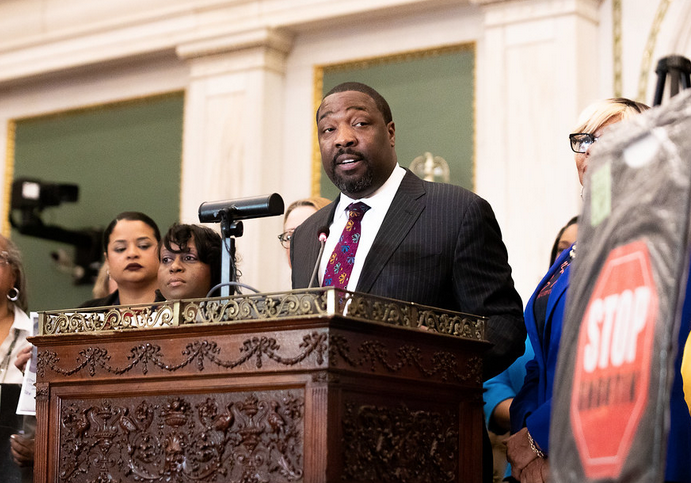
Philly introduces resolution demanding Congress recognize Juneteenth as a national holiday
The city declared the day a holiday last June amid the uprisings following the murder of George Floyd.
Philadelphia City Council introduced a resolution on Thursday, March 4, urging the U.S Congress to designate Juneteenth a national holiday.
“Juneteenth is the oldest recognized celebration of African Americans’ liberation from institutional slavery in the United States,” said City Councilmember Kenyatta Johnson, who introduced the resolution.
In the summer of 2020, global protests broke out in response to the deaths of George Floyd, Breonna Taylor and others. This led to renewed calls for Juneteenth to be recognized as a national holiday.
On June 11, 2020, Congressman Jamaal Bowman, conducted an informal poll on Twitter, writing “RT (retweet) if you think Congress should make Juneteenth a national holiday.”
As of today, it has been retweeted more than 148,000 times.
Wow. Make sure to add your voice here and let's make our voices heard in Congress to finally make Juneteenth a national holiday.https://t.co/sqqkAkDEfc
— Jamaal Bowman (@JamaalBowmanNY) June 12, 2020
NFL Commissioner Roger Goodell wrote in an email released by NPR that the NFL will be observing Juneteenth and their league offices will be closed on that day each year.
Other companies, like Nike and Twitter also announced that they will acknowledge Juneteenth as a paid holiday.
Philadelphia, which has a Black population of 42.1%, officially declared Juneteenth a city holiday last June. Mayor Jim Kenney said in a statement that city offices and facilities will now be closed on June 19 to observe the anniversary of the end of slavery.
For a lot of Americans, their annual celebration of freedom takes place on July 4, the anniversary of the day in 1776 that delegates from the original 13 colonies adopted the Declaration of Independence, declaring their sovereignty from British rule.
On July 5, 1852, abolitionist Frederick Douglass delivered a speech at an Independence Day celebration, addressing the Rochester Ladies’ Anti-Slavery Society.
The Speech, entitled “What to the Slave is the Fourth of July?”, Douglass stated that the Founding Fathers are great men for their ideals of freedom and equality, but he brought awareness to the hypocrisy of these ideals with the existence of slavery on American soil.
Last week I participated in a reading for @harvardcpl of the Fredrick Douglass speech, “What to the Slave Is the Fourth of July?”
— LaTosha Brown (@MsLaToshaBrown) July 5, 2020
Here is a brief excerpt of one my favorite sections of his speech. #BlackVotersMatter #WhatIsTheFourthOfJuly pic.twitter.com/igMWNQCPMq
“Your shouts of liberty and equality, holly mockery; your prayers and hymns, your sermons and thanksgivings, with all your religious parade and solemnity, are, to Him [the American slave], mere bombast, fraud, deception, impiety and hypocrisy -- a thin veil to cover up crimes which would disgrace a nation of savages,” Douglass said.
On Jan. 1, 1863, President Abraham Lincoln signed the Emancipation Proclamation, establishing that all enslaved people in Confederate states “shall be then, thenceforward, and forever free.”
RELATED CONTENT
But in the Lone Star State, slavery persisted, as they experience no large-scale fighting or significant presence of Union troops. Many enslavers from outside Texas migrated there because it was viewed as a “safe haven” for slavery.
After the Civil War ended in the spring of 1865, federal troops arrived in Galveston, Texas to take control of the state and ensure that all enslaved people were freed.
On June 19, General Gordon Granger stood on Texas soil and read General Orders No. 3: “The people of Texas are informed that, in accordance with a proclamation from the Executive of the United States, all slaves are free.”
The newly-found freedom of 250,000 enslaved people led to celebrations, and in 1866, freedmen in Texas organized the first official celebration of “Juneteenth.”
Juneteenth honors the true end to slavery and is considered the longest-running African American holiday. In 1980, Texas became the first state to make Juneteenth a holiday, and 45 other states and the District of Columbia have done the same.
Despite the lack of federal recognition, the holiday is celebrated year after year with festivals, parades, picnics, storytelling, and barbecues.
A final vote on Philadelphia City Council’s resolution is expected on March 11.
“Federal recognition of the holiday would finally give recognition to the evils of American slavery and the centuries-long fight to redeem the American creed of equality for all,” said Johnson.











LEAVE A COMMENT: